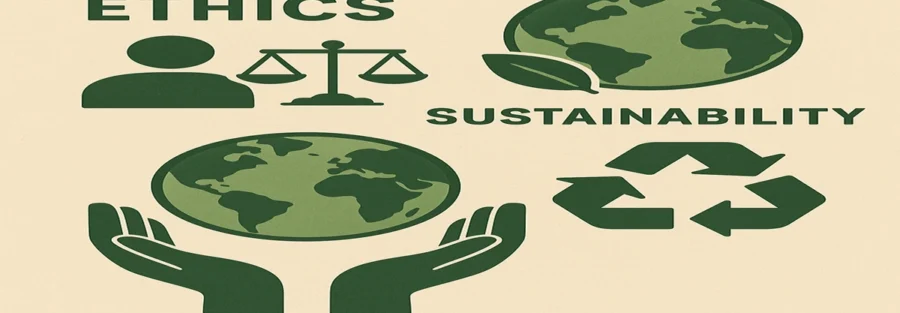Introduction
Today, we all live in a world where technology, business, and lifestyle are changing very fast. But in this changing world, just progress and making profits is not enough. It is also important how we move forward and how our actions affect the coming generations and the earth. This is the reason why words like ethics and sustainability are being discussed everywhere today.
Ethics means making the right choice between right and wrong. It means working honestly, sticking to justice, and moving forward without harming others. Be it business or everyday life, ethics make our every decision clear and strong.
What is Ethics & Sustainability?
Ethics means differentiating between right and wrong and working honestly. That is, a person should keep truth, humanity, and justice in his work, decisions, and behavior.
Sustainability means living and working in such a way that nature (such as water, forest, air, soil, and energy) is not harmed and all these are safe for future generations.
In simple words, Ethics & Sustainability means – working honestly and taking care of nature, and living a life that is beneficial for both today and tomorrow
Why Ethics & Sustainability Matter?
In today’s fast-paced world, the aim of every person and every company should not be just to earn money, but it is also to work properly and responsibly.
Ethics teaches us how to differentiate between right and wrong. If we keep honesty and humanity in our decisions, then people trust us and respect our work.
Sustainability is important because the earth’s resources (such as water, forests, energy and air) are limited. If we use them without thinking, then nothing will be left for the coming generations.
In simple words:
Ethics & Sustainability is important because it makes us a good person, gives trust in the society and secures the future by saving nature.
Key features of Ethics & Sustainability
1. Honesty & Transparency
- The biggest feature of ethics is truth and honesty. When a person or company is honest in its work and does not hide anything, people’s trust in it increases. Transparency means that the work being done should be done openly and clearly, so that no one is cheated.
2. Taking Responsibility
- Every action of ours affects not only us but also society and the environment. Therefore, we must take full responsibility for our work. Whether it is right or wrong, a responsible person or organization always believes that its decisions can affect others.
3. Fairness & Equality
- Another important part of ethics is to treat everyone equally. Not to discriminate in any way – whether it is based on caste, religion, gender, or economic status. When everyone gets equal opportunities and rights, only then can trust and balance be maintained in society.
4. Environmental Protection
- The biggest feature of sustainability is taking care of the environment. The resources we get from nature, such as water, forests, soil, air, and energy, are limited. If we do not use them properly, then there can be a huge shortage of them in the future. Therefore,the wise use of resources and their conservation is very important.
5. Long-Term Thinking
Sustainability teaches us that we should not only look at today’s benefits, but also take care of future generations. If we focus only on short-term benefits, the future may be in danger. For example, if a company cuts trees to earn more profit, then it will benefit today, but in the future, the environment and humans will be harmed.
Case study: Ethics & Sustainability success story
Tata Group (Tata Group, India)
- One of India’s largest and most trusted companies, the Tata Group is a great example of ethics and sustainability.
Strength in ethics
- Tata Group always emphasizes honesty and transparency in its work. Be it business deals, employee rights or dealings with customers – the company has always given priority to honesty. This is why people trust the Tata brand.
Steps towards sustainability
- Tata Group has started many projects for environmental protection and social welfare, such as:
- Green energy projects: Tata Power made major investments in solar energy and wind energy.
- Recycling and resource management: Initiatives for proper use of waste and water in factories.
- CSR (Corporate Social Responsibility): Many schemes for education, health and rural development.
Long term thinking
- Tata believes that making profit is not the biggest goal, but maintaining a balance between society and nature is equally important. Due to this thinking, today Tata is a brand that is trusted not only in India but the whole world.
Lesson
This story of Tata Group teaches us that if a company makes Ethics and Sustainability a part of its business model, then it can not only benefit society and the environment, but can also achieve long term success and trust.
How to use Ethics & Sustainability?
Ethics and Sustainability do not mean just talking big, but adopting them in your daily life and work. Let’s understand how they can be used:
1. Work with Honesty
- Be truthful and transparent in every work. Be it a job or business, always work honestly. The benefits gained by lying or cheating do not last long.
2. Use Resources Wisely
- Water, electricity, paper, plastic – all these are limited things. Instead of wasting them, use them wisely. For example:
- Use LED bulbs to save electricity
- Use cloth or jute bags instead of plastic
- Adopt water recycling and rainwater harvesting
3. Contribute to Society
- Ethics means that we should not only think about ourselves but also work for the society. Such as:
- Helping poor children in their education
- Providing health and education facilities to people
- Joining CSR or NGO to help the needy
4. Care for the Environment
- The most important part of sustainability is the environment. We can bring about a big change even with small steps:
- Planting trees and saving the green environment
- Separating and recycling waste
- Using clean energy like solar energy or wind energy
5. Promote Equality & Fairness
- Part of ethics is to do justice to everyone. Whether at the workplace or in society, do not discriminate in any way. Give equal opportunities and respect to everyone.
Conclusion
In today’s world, Ethics & Sustainability has become not just a need but a responsibility. When we adopt ethics, i.e., honesty and transparency in our work and life, we get trust and respect in society. At the same time, by adopting sustainability, we use nature and resources properly, which maintains balance for future generations as well.
If every person and every institution includes Ethics & Sustainability in their decisions, then we can not only create a better society but also give a safe and clean environment to future generations.
Therefore, we have to understand that real success is only when we take care of the well-being of society and the environment along with profit. This is the real importance of Ethics & Sustainability.
FAQ
Q1. What is Ethics & Sustainability in simple words?
Ethics means doing the right thing with honesty and fairness. Sustainability means using resources wisely so that future generations can also benefit.
Q2. Why is Ethics & Sustainability important?
It helps build trust, protects the environment, supports society, and ensures long-term growth for businesses and communities.
Q3. How can businesses practice Ethics & Sustainability?
Businesses can be honest with customers, avoid unfair practices, use eco-friendly materials, reduce waste, and contribute to social welfare.
Q4. What are some examples of Sustainability in daily life?
Using reusable bags, saving electricity, recycling waste, planting trees, and switching to renewable energy are good examples.
Q5. How do Ethics & Sustainability benefit the future?
They ensure fairness, equality, and a healthy planet, so future generations can live a safe, happy, and balanced life.
Curious about smart transportation and digital growth? Head over to Digital Pracer’s blog and explore content that keeps you ahead of the curve!








